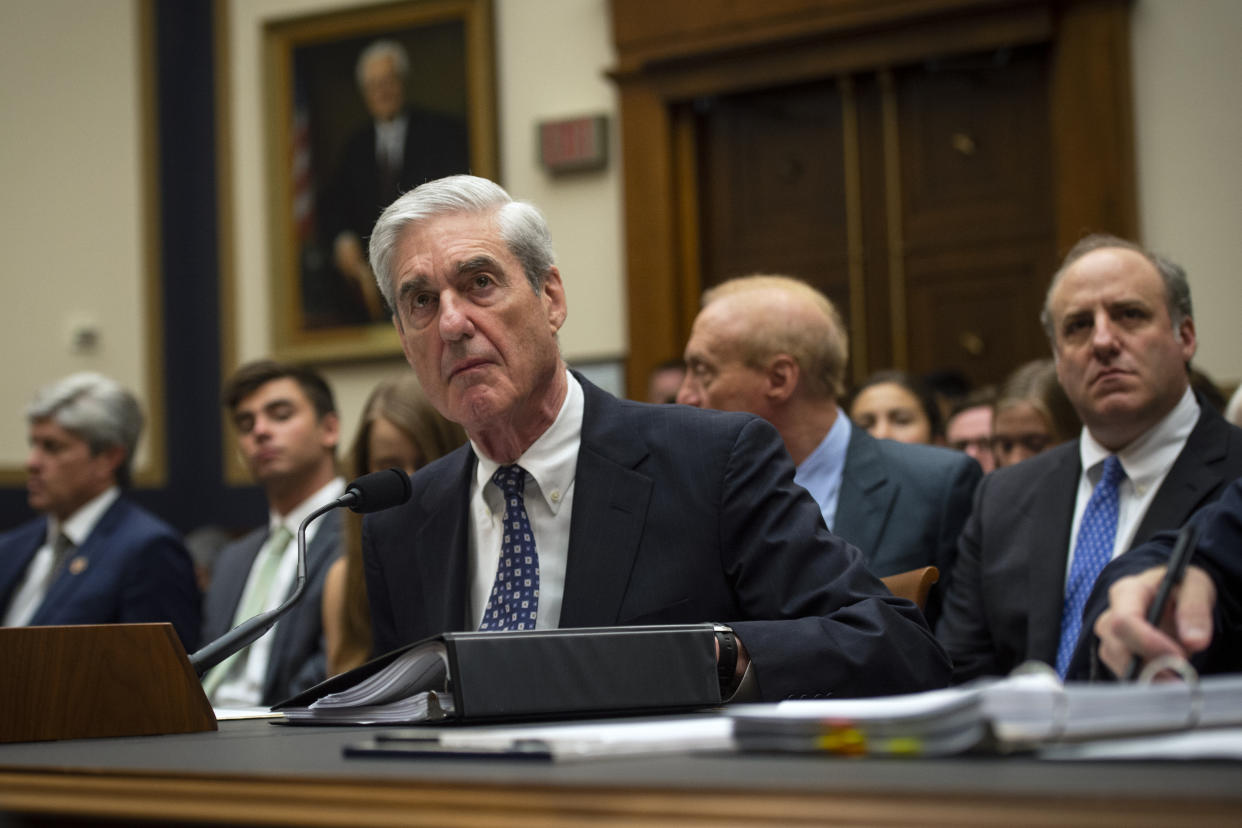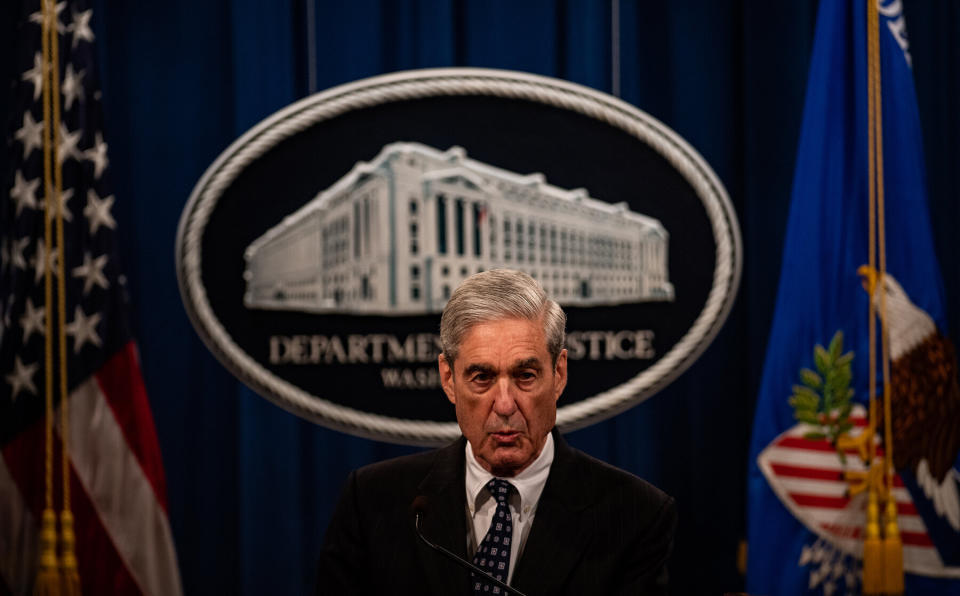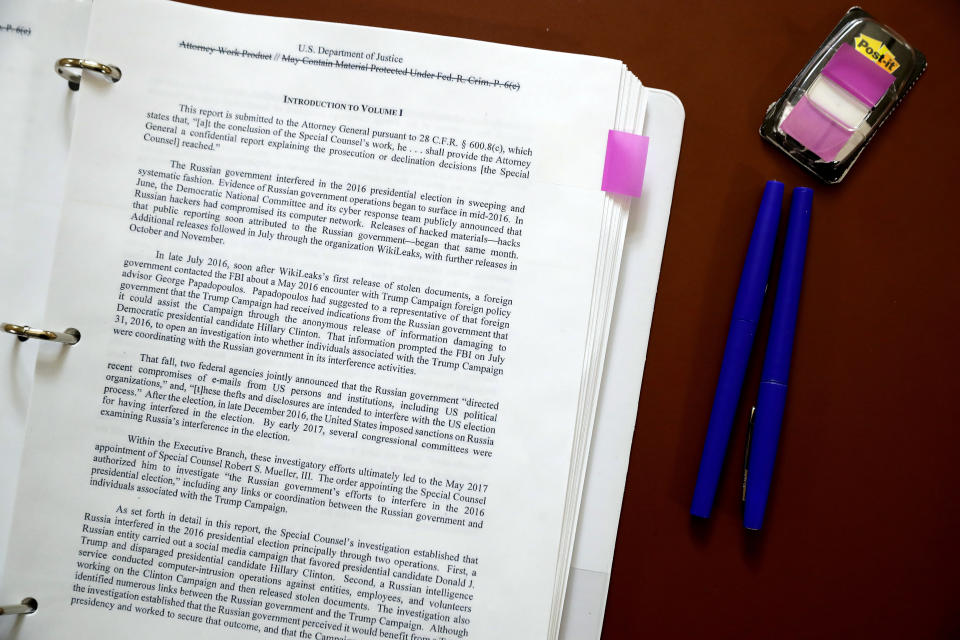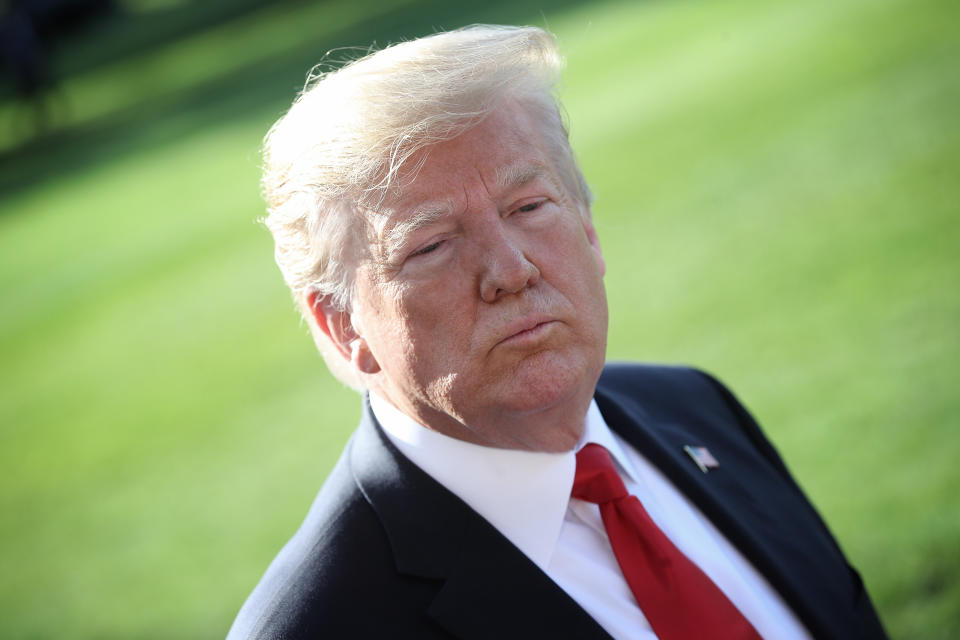Explained: Why Mueller didn't indict Trump and what his testimony means

UPDATE July 24: Mueller comes back before Congress
U.S. Special Council Robert Mueller testified before two congressional committees on Wednesday regarding his report on Russian interference in the 2016 presidential election. His report also addressed possible obstruction of justice by interfering in his investigation by U.S. President Donald Trump.
Democrats and Republicans alike questioned Mueller about his report. Heading into the testimony, Democrats were hoping to stir up new calls for investigations into Trump. Republicans were expected to defend Trump and poke holes in Mueller’s process and his statements.
Here’s what went down.
Mueller said his words would be limited to his report
Prior to his testimony, Mueller had already said that he wouldn’t say anything beyond what was already in his 400-page report and that his words would be “necessarily limited”.
He wasn’t exaggerating when he said his speech would be tactful and without any new information. Many times during the testimony Mueller said Congress’s questions were outside the scope of his inquiry, and that the answers were already in his report.
Mueller repeated his point that Trump isn’t off scot-free
Mueller told Congress what he has already stated in his report, which is that Trump has not be exonerated from obstruction of justice (which the president claims he has).
Familiar points that Mueller continued to hammer home during his testimony included that Russia definitely interfered in the 2016 election, Trump welcomed Russian interference and that Trump officials lied to cover this up.
Mueller wants you to see Russia as the core threat
“Over the course of my career, I’ve seen a number of challenges to our democracy,” Mueller said in his testimony. “The Russian government’s effort to interfere in our election is among the most serious.”
Mueller appeared to be more concise and confident when it came to discussing Russian interference in the 2016 election.
He stressed that Russia isn’t done meddling in American affairs and that remains his primary concern.
Was it a win for Democrats or Republicans?
While Democrats got the answers they needed from Mueller, which was to confirm that Trump isn’t entirely innocent, Republicans had some unexpected triumph as well.
Vox reported that Mueller’s limited speech at times left him open to critical attacks from the Republicans, as their points went unchallenged. Several outlets criticized the Republicans for using Mueller’s silence to push conspiracy theories during the testimony.
What happened leading up to Mueller’s July appearance in Congress?
On May 29, Special Counsel Robert Mueller made his first statement regarding the two-year probe into Russian interference in the 2016 U.S. presidential election.
He said his team couldn’t bring criminal charges against U.S. President Donald Trump because he believed that would be unconstitutional.
But the lack of charges doesn’t exonerate the president nor does it mean they are confident that he’s innocent, Mueller said.
“If we had had confidence that the president had clearly not committed a crime, we would have said so,” said Mueller. “Charging the president with a crime is not an option we could consider.”

He said it would be “unfair” to charge someone with a crime if a court resolution can’t be found.
With Mueller finally speaking on an investigation that has been reported on for almost two years, many are wondering whether this is the conclusion to understanding whether Trump colluded with Russia on his election campaign, or whether there’s more developments to come.
Canadians have questions about the nature of the investigation, what’s in Mueller’s report, and why charges weren’t laid.
What was the nature of the Russia investigation and how did it begin?
The probe that was led by Robert Mueller began in May 2017, but an investigation into Donald Trump’s presidential campaign activities was already underway by July 2016.
The FBI began to look into possible suspicious links between Russian officials and those associated with Trump’s campaign a few months prior to election day in the U.S.
Their investigation was sparked by information from Australian officials that Trump’s presidential campaign advisor at the time, George Papadopoulos, had informed the Australian High Commissioner to Britain, that Russia was in possession of information that could damage Hilary Clinton’s campaign.
Though there is some speculation, this meeting between Papadopoulos and the commissioner Alexander Downer was thought to be what first caused the FBI to get involved.
After Trump fired FBI Director James Comey, Democrats called for a special counsel to be appointed to take over the FBI’s work on the Russia probe so far.
Deputy Attorney Rod Rosenstein appointed Robert Mueller, who was known as being a former director of the FBI.
The investigation would look into two main topics. One would be whether obstruction of justice charges would be needed against Trump and his circle if they potentially blocked investigators from seeking their investigation. The other would be whether there was any collusion, so if Trump or his aides worked with Russian officials to interfere with the 2016 election.
Topics that were investigated included the hacking of Democrats emails that were leaked in 2016, possible links between Donald Trump Jr. and Russian officials, Russian social media propaganda, and why Trump fired National Security Advisor Michael Flynn.
There were many other topics Mueller pursued that resulted in 34 people being indicted, as Mueller’s mandate was to follow any other matters that could arise through the investigation.
One high profile arrest was Trump’s former campaign chairman Paul Manafort was found guilty on eight felony counts of tax evasion and bank fraud. Thirteen Russian citizens and three Russian organizations were indicted as well.
What was in the final report?

The 448-page report was released on April 18, 2019, with redactions. There’s a lot of content to go through, but essentially there are a couple of main messages.
Mueller is clear that his investigation couldn’t prove that there was a conspiracy between Russian officials and Trump’s circle to interfere with the election.
But, he does say that he’s alarmed by his findings and isn’t confident that Trump is entirely innocent.
“If we had confidence after a thorough investigation of the facts that the President clearly did not commit obstruction of justice, we would so state,” Mueller wrote in the report. “We are unable to reach such a judgment.”
The report overall states that Trump’s campaign happily benefited from the hacks to Democrats and that the Russian government did try to help him win the election.
One aspect of Trump’s behaviour leading up to the election that Mueller flagged was Trump’s desperation for his team to “find” Hilary Clinton’s deleted emails (which they didn’t accomplish).
The report also proved Trump’s campaign advisors had many ties to Russia and that Trump worked hard to impede the FBI’s investigation.
Despite this, no charges against Trump have come about from the investigation and he’s no longer in the hot seat when it comes to this specific probe from Mueller.
Why won’t Mueller charge Trump with a crime?
Ultimately, Mueller’s examination of contacts and connections between Russia and Trump aides did not add up to “substantive” proof of “violation of federal criminal law”.
This means that although these kinds of connections may be suspicious, they might not directly break laws and therefore won’t result in charges.
A full-blown conspiracy couldn’t be established despite shady behaviour.
What did Mueller say in his public statement, and what does it mean?
When Mueller finally spoke publicly about the investigation on May 29, he characterized his report as harsher to Trump than many originally interpreted.
By stating that if Trump didn’t commit a crime, he would have said so, he once again put the spotlight on possible wrongs Trump might have engaged in.
Mueller’s statements were polar opposite to Attorney General William Barr’s characterization of the report. Barr said there was insufficient evident to charge Trump and Trump himself has been adamant that he’s completely innocent.
However, Mueller spoke about not being able or allowed to charge the president with a crime. This stems from a policy that blocks sitting presidents from facing charges that dates back to 1973, when Richard Nixon was in office.
Right before Nixon resigned the U.S. Department of Justice instituted a policy that determined that any criminal charges against a president would interfere in their ability to fulfill official duties.
This means that only an impeached president could be charged with a crime.
Memos from the Justice Department are the only policy concerning charging a president and it’s not an issue the Supreme Court has ruled on. The U.S. Constitution also doesn’t address this issue.
Vox interviewed 16 different legal experts and found the majority of them said a sitting president can be indicted, but it’s a complex issue.
That has led those who believe Trump should be charged to think that justice will only come if he’s impeached.
Can Trump be impeached?
Some Democrats have taken Mueller’s statements as a sign impeachment proceedings must be started against Trump, so that he can be criminally charged.
Democratic candidates Cory Booker, Kirsten Gillibrand and Pete Buttigieg publicly stated for the first time that impeachment is the best option to handle Trump.
According to CNN, the first step in impeachment proceedings is for a party to allege that an impeachable offence has been committed by the president. Lots of groups can make this charge, including Robert Mueller.
Then, the U.S. House of Representatives would have to authorize an investigation. They would also draw up articles of impeachment. Then, the entire House must vote on those articles.
If a majority are in agreement about the articles of impeachment, then the Senate holds a public trial and a verdict on impeachment would be decided.
Based on the math, Democrats could lose a majority in the House by 17 votes and still have a majority needed for impeachment. But in the Senate, 20 Republican votes would need be cast against Trump in order for him to actually be convicted.
How has Trump reacted?
Trump has attacked Mueller on Twitter and with statements to the media, repeating his innocence along with making false claims. He said the Mueller report had exonerated him, which Mueller has repeatedly said is not true.
The Greatest Presidential Harassment in history. After spending $40,000,000 over two dark years, with unlimited access, people, resources and cooperation, highly conflicted Robert Mueller would have brought charges, if he had ANYTHING, but there were no charges to bring!
— Donald J. Trump (@realDonaldTrump) May 30, 2019
Russia, Russia, Russia! That’s all you heard at the beginning of this Witch Hunt Hoax...And now Russia has disappeared because I had nothing to do with Russia helping me to get elected. It was a crime that didn’t exist. So now the Dems and their partner, the Fake News Media,.....
— Donald J. Trump (@realDonaldTrump) May 30, 2019
....say he fought back against this phony crime that didn’t exist, this horrendous false accusation, and he shouldn’t fight back, he should just sit back and take it. Could this be Obstruction? No, Mueller didn’t find Obstruction either. Presidential Harassment!
— Donald J. Trump (@realDonaldTrump) May 30, 2019
What’s next for the Russia investigation?

Mueller stated that he has resigned and the investigation is over. But now, a push to investigate the investigation is underway.
Several reviews into how the Russia investigation was conducted are currently in motion, with one by the Justice Committee’s internal watchdog, another by a Utah federal prosecutor and another by Barr.
But the Russia probe wasn’t the only investigation being conducted concerning Trump.
There are other federal investigations to do with Trump that are being handled by other departments within the Justice portfolio. This includes an investigation on whether Trump was involved in paying off porn star Stormy Daniels to lie about an alleged affair she had with the now president in the mid-2000s.

